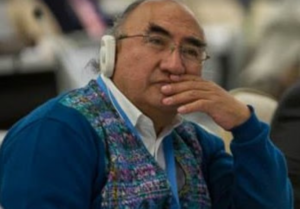
- Details
- By Native News Online Staff
GENEVA, Switzerland — United Nations Special Rapporteur on the Rights of Indigenous Peoples Francisco Cali Tzay launched a formal study on Wednesday focused on the impact of the COVID-19 pandemic on the human rights of Indigenous Peoples.
The Special Rapporteur is calling for responses by June 15th, 2020 due to the urgency of the situation. The outcomes of this study will be presented to the 75th Session of the UN General Assembly, which will begin on September 15, 2020.
The questionnaire covers a wide range of issues and impacts on Indigenous Peoples’ rights to health and medical care, food, livelihoods, cultural practices, mobility, access to vital services and infrastructure, self-determination and participation in decision-making regarding the development and implementation of their own as well as the state's responses to the pandemic.
It also requests information about human rights violations occurring and, in some cases, increasing, during this crisis, including development projects lacking the free prior and informed consent of the Indigenous Peoples impacted and reprisals against Indigenous human and environmental rights defenders. It also calls for the submission of good practices and identification of gaps by states, Indigenous Peoples, and other relevant parties.
Tzay assumed his role as Special Rapporteur on May 1, 2020, with the pandemic already underway.
“Prior to assuming my mandate I had already designated a list of priority issues for the first year of my term. This includes land and resource rights, Indigenous human rights defenders, rights of Indigenous elders, women and children, Indigenous persons with disabilities, cultural rights, and militarization,” Tzay said. “Based on the urgent information I have already received from Indigenous Peoples from all regions, I can confirm that the COVID-19 pandemic, in both its impacts and the responses undertaken by some states, directly impacts all of these rights and concerns, and must be addressed in the most urgent manner by my mandate.”
The questionnaire can be downloaded using the following links:
https://www.ohchr.org/EN/Issues/IPeoples/SRIndigenousPeoples/Pages/Callforinput_COVID19.aspx
More Stories Like This
Native News Weekly (August 25, 2024): D.C. BriefsUS Presidents in Their Own Words Concerning American Indians
Senate Committee on Indian Affairs Passes 12 Bills to Strengthen Tribal Communities
Deb Haaland Tours CNM Workforce Facilities, Highlights Trade Job Opportunities
Federal Court Dismisses Challenge to NY Indigenous Mascot Ban
Help us defend tribal sovereignty.
At Native News Online, our mission is rooted in telling the stories that strengthen sovereignty and uplift Indigenous voices — not just at year’s end, but every single day.
Because of your generosity last year, we were able to keep our reporters on the ground in tribal communities, at national gatherings and in the halls of Congress — covering the issues that matter most to Indian Country: sovereignty, culture, education, health and economic opportunity.
That support sustained us through a tough year in 2025. Now, as we look to the year ahead, we need your help right now to ensure warrior journalism remains strong — reporting that defends tribal sovereignty, amplifies Native truth, and holds power accountable.
 The stakes couldn't be higher. Your support keeps Native voices heard, Native stories told and Native sovereignty defended.
The stakes couldn't be higher. Your support keeps Native voices heard, Native stories told and Native sovereignty defended.
Stand with Warrior Journalism today.
Levi Rickert (Potawatomi), Editor & Publisher

